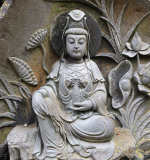| Download and install the indispensable font(s) to view Sanskrit in its full glory Read Transliterating (2) (English) to fully understand the transliteration system |
Tantrasāra (Tantrasara): Chapter 18
Abhiṣekaprakāśanam - Explaining the consecration
Introduction
This is the eighteenth chapter (called Abhiṣekaprakāśanam).
This work was written by the great Master Abhinavagupta and is a summary of Tantrāloka. Tantrāloka is the most important and voluminous work of the greatest Trika Master. Abhinavagupta was also the teacher of eminent Kṣemarāja and lived about 975-1025 AD in Kashmir.
This treatise whose name is Tantrasāra is a summarized encyclopedia of Tantra. Since it is a very advanced text in Trika Shaivism, there is no surprise if a neophyte finds it difficult to understand. To start to understand it, the level of the reader must be the one of a real disciple in Trika Shaivism. If this requirement is not met, then there will be a lot of confusion and constant disappointment. Because in spite of my great efforts to explain the things so easily as possible, to study this treatise requires some spiritual caliber. In this system, sometimes it is not possible even to write about certain topics due to the extreme limitation of the words. Because in the end, all this knowledge has to do with 'states', and it is extremely difficult to write about 'states' in a precise way. Abhinavagupta has done his best to accomplish this formidable task of writing about what is superior and intangible. Anyway, despite his incredible skills to carry out this, he is not revealing everything. It is not because he is all the time hiding things from the reader, but because he is sometimes hiding and on other occasions he just cannot write about some extremely subtle topics because of the limitation of the words.
Goal of life is Liberation. Man has searched for freedom always in human history, but according to Trika Shaivism that is not real Liberation. Real Liberation does not mean that your body should be free from some prison and things like that. Real Liberation amounts to attaining His Svātantrya or Absolute Freedom. When the Great Lord's Svātantrya is achieved, then you see unity in all the things, i.e. you stop seeing duality as before. All is forever identified with Svātantrya, with Him, and that is the end of the story called 'you in bondage'. From this point on nothing will get in your way, because if something apparently gets in your way, that is Svātantrya again. This constant awareness of unity in all is real Freedom. There is no other attainment greater than this!
Keeping the above in mind, now read Tantrasāra and experience Supreme Delight, dear Śiva.
Important: All that is in brackets and italicized within the translation has been added by me in order to complete the sense of a particular phrase or sentence. In turn, all that is between double hyphen (--...--) constitutes clarifying further information also added by me.
Chapter 18
तन्त्रसारः
अष्टादशमाह्निकम्
स्वभ्यस्तज्ञानिनं साधकत्वे गुरुत्वे वाभिषिञ्चेत् - यतः सर्वलक्षणहीनोऽपि ज्ञानवानेव साधकत्वेऽनुग्रहकरणे चाधिकृतः नान्योऽभिषिक्तोऽपि। स्वाधिकारसमर्पणे गुरुर्दीक्षादि अकुर्वन्नपि न प्रत्यवैति पूर्वं तु प्रत्यवायेनाधिकारबन्धेन विद्येशपददायिना बन्ध एवास्य दीक्षाद्यकरणं सोऽभिषिक्तो मन्त्रदेवतातादात्म्यसिद्धये षाण्मासिकं प्रत्यहं जपहोमविशेषपूजाचरणेन विद्याव्रतं कुर्यात्तदनन्तरं लब्धतन्मयीभावो दीक्षादावधिकृतस्तत्र नायोग्यान्दीक्षेत न च योग्यं परिहरेद्दीक्षितमपि ज्ञानदाने परीक्षेत छद्मगृहीतज्ञानमपि ज्ञात्वोपेक्षेतात्र चाभिषेकविभवेन देवपूजादिकम्।
स्वभ्यस्तज्ञानतया स्वार्थपरार्थाधिकारतां वहतः।
साधकगुरुतायोगस्तत्र हि कार्यस्तदभिशेकः॥
Tantrasāraḥ
Aṣṭādaśamāhnikam
Svabhyastajñāninaṁ sādhakatve gurutve vābhiṣiñcet - Yataḥ sarvalakṣaṇahīno'pi jñānavāneva sādhakatve'nugrahakaraṇe cādhikṛtaḥ nānyo'bhiṣikto'pi| Svādhikārasamarpaṇe gururdīkṣādi akurvannapi na pratyavaiti pūrvaṁ tu pratyavāyenādhikārabandhena vidyeśapadadāyinā bandha evāsya dīkṣādyakaraṇaṁ so'bhiṣikto mantradevatātādātmyasiddhaye ṣāṇmāsikaṁ pratyahaṁ japahomaviśeṣapūjācaraṇena vidyāvrataṁ kuryāttadanantaraṁ labdhatanmayībhāvo dīkṣādāvadhikṛtastatra nāyogyāndīkṣeta na ca yogyaṁ parihareddīkṣitamapi jñānadāne parīkṣeta chadmagṛhītajñānamapi jñātvopekṣetātra cābhiṣekavibhavena devapūjādikam|
Svabhyastajñānatayā svārthaparārthādhikāratāṁ vahataḥ|
Sādhakagurutāyogastatra hi kāryastadabhiśekaḥ||
Essence of Tantra (tantra-sāraḥ)
Eighteenth (aṣṭādaśam) chapter (āhnikam)
(The Guru) should consecrate --by ablution or sprinkling water-- (abhiṣiñcet) someone who has practiced well his Knowledge --also, "who has studied well his Knowledge"-- (su-abhyasta-jñāninam) in order for him to become a sādhaka --he is going for bhukti or enjoyment, i.e. supernatural powers-- (sādhakatve) or (vā) a Guru (gurutve) — (Why?) Because (yatas), even (api) devoid of all characteristics --i.e. even if he does not have any other quality-- (sarva-lakṣaṇa-hīnaḥ), only (eva) a possessor of Knowledge (jñānavān) (is) authorized (adhikṛtaḥ) for sādhakahood (sādhakatve) and (ca) Grace bestowal --viz. Guruhood-- (anugraha-karaṇe), (and) not (na) another (person who does not possess Knowledge) (anyaḥ) —even if (api) he has been consecrated (abhiṣiktaḥ)—|
Having imparted his own authority (to some disciple) (sva-adhikāra-samarpaṇe), a Guru (guruḥ) does not (na) incur sin (pratyavaiti) even if (api) he does not perform (akurvan) initiation, etc. (dīkṣā-ādi). But (tu) before (that) --i.e. before delegating his authority to some disciple-- (pūrvam), his (asya) omitting to perform initiation, etc. (dīkṣā-ādi-akaraṇam) (has) indeed (eva) a connection (bandhaḥ) with sin (pratyavāyena) due to a bond with authority (adhikāra-bandhena) on the part of the giver of the state of Vidyeśa --i.e. the Guru is the giver of the state of Lord of Knowledge-- (vidyā-īśa-pada-dāyinā). He (saḥ) who has been (so) consecrated (as a Guru) (abhiṣiktaḥ) should perform (kuryāt) the Knowledge vow (vidyā-vratam) by practicing japa --muttering of a Mantra--, homa --offering oblations into the fire-- and special worships (japa-homa-viśeṣa-pūjā-ācaraṇena) every day (prati-aham) during six months (ṣāṭ-māsikam). (What for?) For attaining identity or union with the deity of the Mantra (mantra-devatā-tādātmya-siddhaye). Immediately after that (tad-anantaram), once the state of identity with That --viz. with the deity of the Mantra-- has been attained (labdha-tad-mayī-bhāvaḥ), (this brandnew Guru) has authority (adhikṛtaḥ) to perform initiation, etc. (dīkṣā-ādau). Under those circumstances (tatra), he should not initiate (na... dīkṣeta) the ones who are not fit (ayogyān), nor (na ca) should he avoid (pariharet) someone who is fit (yogyam). When giving Knowledge (jñāna-dāne), (the Guru) should also carefully inspect (api... parīkṣeta) the initiated one (dīkṣitam). After learning (jñātvā) that someone has even gotten Knowledge by means of deceit (chadma-gṛhīta-jñānam api), (the Guru) should disregard (that) (upekṣeta). Here (atra ca), worship of the deity, etc. (deva-pūjā-ādikam) (should be carried out) according with the wealth (invested) in the consecration (abhiṣeka-vibhavena)|
"(There is) the partaking of sādhakahood or Guruhood (sādhaka-guru-tā-yogaḥ) in the case of someone who, having well-practiced Knowledge, possesses (su-abhyasta-jñānatayā... vahataḥ) authority over his own goals and the goals of others (sva-artha-para-artha-adhikāratām). (Therefore,) that consecration (tad-abhiśekaḥ) is to be given --lit. is to be made-- (kāryaḥ) to him --lit. in him-- (tatra) without doubt (hi)"||
TRANSLATION IS COMPLETELY FINISHED BUT THERE IS NO POLISHING YET
Further Information
This document was conceived by Gabriel Pradīpaka, one of the two founders of this site, and spiritual guru conversant with Sanskrit language and Trika philosophy.
For further information about Sanskrit, Yoga and Indian Philosophy; or if you simply want to comment, ask a question or correct a mistake, feel free to contact us: This is our e-mail address.
| Back to Chapter 17 | Continue to read Chapter 19 |





























